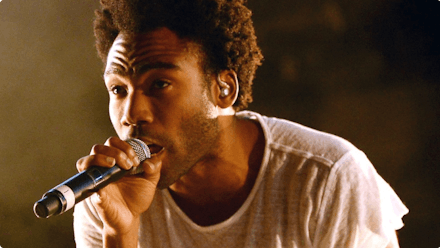Childish Gambino Thinks the Internet is Ruining Our Lives, and He's Fighting Back

For the past year, Donald Glover — of Community and Derrick Comedy fame — has been building a crazy, mixed-media, conceptual world to promote his new Childish Gambino album, Because the Internet.
He released a short film, Clapping for the Wrong Reasons, in August to introduce listeners to the characters. He turned his Twitter and Instagram accounts into viral marketing machines, constantly tweeting and re-tweeting "Roscoe's Wetsuit" — a "meaningless" phrase that guides his album's main character, The Boy, through his strange journey. Glover wrote an accompanying screenplay designed to be read alongside the album to develop this narrative. Glover even started dressing like the main character.
This excessive promotion blurs the boundaries of Childish Gambino's art with the realities of living in the internet age. As streaming services and digital downloads replace traditional forms of music consumption, all artists must create with the internet in mind. Their art must not only hold the fickle listener's attention, but should also be challenging enough actually to matter. Gambino's Because the Internet is perfectly adapted to this environment. It knows how to thrive on the internet, even as it negatively critiques the internet's effects on consciousness and culture.
The songs on Because the Internet are made up of contrasting samples. Broken vocals lines, classical strings, trap beats, psychedelic synths, distorted church choirs, and soccer mobs compete for center stage on "Crawl." The clash creates an exhilarating tension between tones. Songs like "No Exit" and "Earth: The Oldest Computer" oscillate between cool-and-collected and disjointed-and-punishing.
Some songs take this patchwork aesthetic to such an extreme that they sound as if listeners have several videos playing simultaneously on different tabs. "Sweatpants" has odd snippets of shouts and catcalls built into the beat with even more interruptive audio textures coming later. The song cuts out altogether after Gambino shouts, "And I don't give a fuck about my family name," leaving only the sounds of forks, knives, and plates scraping in a dining room. Listening to the album is a harrowing experience. It's also enlightening.
The way Gambino manipulates his samples mirrors the click-happy way most people skim through bookmarked sites, Twitter feeds, and albums on Spotify. But even as it mirrors those qualities, the variety and unpredictability in the album's sound keep listeners on their toes and discourages them from shuffling away. In making an album that sounds like the internet, Gambino resists the detrimental listening habits it encourages.
The album's accompanying screenplay deepens this quality. It allows Gambino to bring out the narrative while leaving space in his verses for more punchlines. The screenplay tells the story of a rich black kid trying to find meaning in his increasingly digitized life. He works as a professional internet troll. He has no skills, "nothing to offer to anybody," and "no real friends." He leads his life on the internet.
Each scene deepens the meaning of its corresponding song. As skilled as we all may be at multi-tasking, it's impossible to process the absurdist dialogue and rapid-fire lyrics of the songs at the same time. This process requires a lot more than a casual listen. It demands total immersion.
Gambino is trying simultaneously to illustrate and address the trouble of making art on the internet. At its best, the internet can bring together different media and enhance an artistic experience. At its worst, it's overwhelming and impossible to parse. There are 50,400 hours of video uploaded to YouTube and 20,000 songs added to Spotify every day. Few people wind up actually engaging, or, as Gambino says in "Telegraph Ave": "And they're saying it's because of the internet / Try once and it's on to the next shit."
It isn't a lament though — what Childish Gambino has given us is hope for a solution.
Gambino's album is scattered, but it's also a crystal clear reflection of what the internet does to art, meaning, and the consumers of both. It's less an album than a call to action — a plea for everyone to make the digital world a better place. This "we're all in this together" notion resonates throughout the album. When he quit Community, Glover wrote an intensely confessional open letter on Instagram explaining the decision. His last in the series reads:
This is a big, scary album. It tells us that we're too far into this technology to turn back, and it's right. It isn't a lament though — what Childish Gambino has given us is hope for a solution. Hope for a way to bring meaning back to lives online.